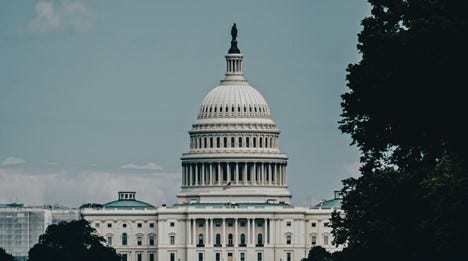House Republicans are plowing forward with plans to mark up their funding bills at lower levels than the limits agreed upon with Democrats just weeks ago, teeing up what could be a nasty spending battle — and a potential government shutdown — later this year. (The Hill)
Democrats are fuming after House Republicans said this week that they plan to shoot for much lower than the top-line spending targets negotiated by President Biden and Speaker Kevin McCarthy (R-Calif.) as part of their deal to raise the debt limit.
Rep. Rosa DeLauro (Conn.), the top Democrat on the House Appropriations Committee, told reporters Tuesday the latest move across the aisle “all but guarantees a shutdown.”
Comment: It’s clear that the ultra-right members of the House Freedom Caucus (HFC) are not giving up their fight to slash federal budgets. They did not take kindly to the deal that House Speaker McCarthy and President Biden negotiated.
To prove their point HFC members stopped a series of bills being reported out for a House floor vote. It was viewed by congressional insiders as a shot across the speaker’s bow. Although the bills were finally released on the promise of on-going negotiations, the fight will continue well into this fiscal year that ends on September 30, 2023.
The clashes will take the form of appropriations legislation passed out of committees on partisan votes below the debt ceiling agreement. Although the budget bill passed, it’s up to Congress now to pass appropriations legislation. McCarthy vowed in his campaign for the Speaker’s chair to pass 12 separate appropriations bills. Congress has for years relied on continuing resolutions because of its failure to pass individual bills.
Word on the Hill is that the House Freedom Caucus is saber-rattling over what they see are McCarthy’s broken promises but failing to be clear about what they’re after. At some point look for Republican moderates to push back on the 20 or 30 HFC members and vote with the Democrats—as they did on the budget and debt ceiling arrangements
The price tag of Democrats’ landmark climate law is ballooning. Whether that’s a bad thing or a good thing depends on your perspective and political party.
The clean-energy tax credits in the Inflation Reduction Act, which President Biden signed last August, were initially projected to cost $270 billion over the next decade. But this month, the nonpartisan Joint Committee on Taxation released a “very preliminary” new score of the tax credits, putting the cost at $663 billion.
Comment: The tax credits are very popular with consumers, as are the incentives for manufacturers of photovoltaic panels, batteries, and other clean energy systems and components. Notwithstanding the $270 billion appropriated for the tax credits in the IRA legislation there’s no actual cap on spending levels.
Notwithstanding the on-going efforts by House Republicans to rescind many of the clean energy incentives in the IRA, they’re unlikely to succeed—even with the assistance of Senator Joe Manchin (D-WV) who is bemoaning the success of the bill he was instrumental in passing.
For more on Manchin’s actions see the Two Joes article.


